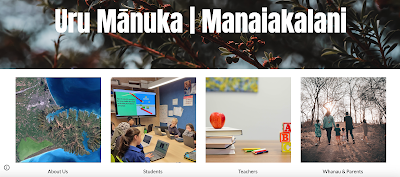I clearly recall my time leading teacher professional development. Teacher practice was hard to shift. But it was very rarely a result of an 'I can't be bothered' attitude. It was much more likely that the thought process was 'Yes I see what you are saying, and why this would be a good idea, but.. what would it look like in my daily practice?'. And once you were able to show that, the almost universal response was 'aha, I get it, righto then...let's crack on with it'.
I think this 'fostering creativity' and this 'learning city' thing are similar. What could it look like? I use the word 'could' because I reckon that there isn't ONE formula, there isn't ONE way, to do this. What's more, I think that any city or organisation needs a multitude of approaches and responses. After all, that's creativity isn't it? I wanted to try to capture a little of what it already looks like in Ōtautahi Christchurch right now.
The Greater Christchurch Schools' Network (GCSN) works with schools and the city's libraries to bring creative opportunities to school aged children. These are typically digitally focussed (because that is the 'raison d'etre' of GCSN). Here is a sampling of the activities on offer in 2024.
Then there's
'kidsFest', an annual festival of activities for children that has run in Ōtautahi since the 1990's
There's the work of
Ako Ōtautahi - Learning City Christchurch and its annual 'learning days' celebration. This celebration aims to showcase learning, and the value of learning, to connect more and more of those who work in that area in the city, beyond the more usual compulsory school sector.
The 'climate change' campus, set up on the original site of Avonside Girls' High School in the east of the city, attempts to connect young people with the issues around climate change, and what they can do to mitigate the existential dangers of the current climate crisis.
Cities typically also have their own performance based cultural institutions. In Ōtautahi Christchurch, our very own
Court Theatre is something of an icon.
There are a number of other 'players' in the market place. There's the 'Egg Academy', the brainchild of Kane Stewart:
The 'Word' festival in Ōtautahi, certainly not unique to the city, and not a 'small player':
The Canterbury Poets' Collective:
And let's not forget that there are also many not for profit clubs and societies that offer creative growth opportunities.
For example dance clubs:
 |
| https://www.christchurchrocknroll.org.nz/ |
... and craft clubs:
 |
| The Christchurch City Council information web page on craft groups etc |
My concern about many of these is whether or not they serve the 'democratisation' of learning. Do they succeed in serving those most vulnerable in our community? I recall the story of a young man with whom I worked in a school.. he was a seriously good rapper. He left school, and (I think) went the way of the gangs. As a society we lost the benefit of his amazing creativity, and may in the future face the social and economic costs of a human being who crosses the law. I hope not.
Then there is what is happening in the schooling sector itself. I'm yet to be convinced that schools in general give creativity the emphasis it demands or deserves, but certainly within schools in the Manaiakalani network creativity is a central part of their underlying pedagogy. There are two school clusters in Ōtautahi that are part of the network (although not all schools in each Kāhui Ako participate): Uru Mānuka in the west, and Te Pai Tūhura in the northeast.
This summarises their underlying pedagogy.
One kura in the Uru Mānuka kāhui ako tries to place creativity at the centre of what it does.
This gives you a glimpse into what this could look like, it is all fabulous stuff. I'm not sure that it is not enough though. More effort, more thought, more resource, needs to be applied to the challenge of creating creative communities, communities in which there is a clear 'creative vibe', or perhaps just as importantly there is a clear and visceral 'learning vibe', communities in which creativity and learning are 'just the way we are'.
The challenge is 'how do we do that'?

















No comments:
Post a Comment